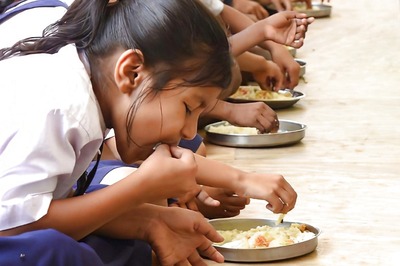
views
Despite a harsh lockdown when almost all the wheels of the stood still, an unprecedented Covid-19 pandemic and an intense farmers’ protest that has entered its 100th day, the country’s agriculture sector continues to post optimistic pictures in terms of crop production.
On the second anniversary of PM Kisan Samman Nidhi Yojana, the union agriculture minister made a special reference to the resilience of the fam sector and farmers in staring down Covid-19. “No matter how much adversity the country’s economy is besieged with, if the agriculture sector and the farmers are ready to fight it, they have the potential to pull the country out of adversity even while all other sectors come to a standstill,” Narendra Singh Tomar said. In a statement on the area covered under summer crop, the government while releasing data said that the overall trend of summer sowing progress is “very good”, and therefore, “there is no impact of Covid-19 pandemic situation” on sowing of summer crops. On Friday, union finance minister Nirmala Sitharaman acknowledged: “Agriculture contribution is very well recognised even during the lockdown phase.”
The government released the area coverage under summer crop as on the 5th of March. In a statement, the government said that the total summer crops have been sown on 39.58 lakh hectare against 32.34 lakh hectare during the corresponding period last year. This indicates an increase of 7.94 lakh hectare in net sown area as compared to the same time last year. While coarse cereals, oil seeds and rice clocked an increase in net sown area, the area under pulses reflected a decrease. The area under coarse cereals rose by 0.06 lakh hectares, oilseeds by 0.69 lakh hectares, rice by 6.54 lakh hectares, but the area under pulses decreased marginally by 0.05 lakh hectares.
On February 18, the ministry of agriculture and farmers’ welfare released the second advance estimate for major agricultural produce, projecting a “record” food grain production while noting that the cumulative rainfall in the country during June to September 2019 had been 10% higher than the LPA. The total food grain production for 2019-20 was a record 291.95 million tonnes compared to 285.21 million tonnes in 2018-19, higher by 6.74 million tonnes. The ministry noted that the overall production during 2019-20, when compared to the average of the previous five years, i.e., 2013 -14 to 2017- 18, was higher by 26.20 million tonnes.
The production of rice, wheat, coarse cereals, pulses, sugarcane and jute is all set to rise compared to the average production in the past five years. The production of rice is estimated to touch a record 106.21 million tonnes from the five-year average of 107.80 million tonnes. The production of wheat is set to touch a record of 106.21 million tonnes, up from the average of 94.61 million tonnes, and production of pulses is estimated to touch 23.02 million tonnes up from the five-years average of 20.26 million tonnes.
Similarly, the second advance estimate projects coarse cereal production of 45.24 million tonnes, up from 43.06 million tonnes in 2018-19 and oilseeds production of 34.19 million tonnes, up from 31.52 million tonnes in 2018-19.
As the farmers’ protest swirls in parts of the country, data released by the ministry of consumer affairs and food show that procurement of paddy at the minimum support price is higher compared to the corresponding time in previous years. Kharif paddy procurement in 2020-21 is 670.44 LMT compared to 585.41 LMT at the same time last year.
This is an increase of 14.52%. The figure of procurement from Punjab, the state that is most affected in the ongoing farmers’ protest is 202.82 LMT, which is a significant 30.25% of the total paddy procurement. The ministry further said, “About 97.90 lakh farmers have already been benefited from the ongoing KMS procurement operations with MSP value of Rs. 1,26,580.51 crore.”
Read all the Latest News, Breaking News and Coronavirus News here




















Comments
0 comment